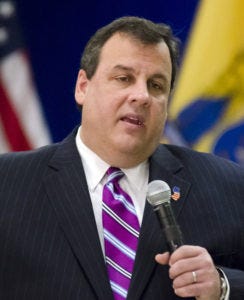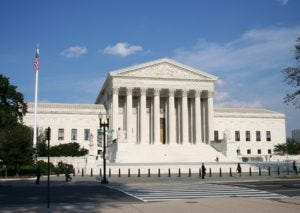A Bridge Too Far? Supreme Court Agrees to Hear the Bridgegate Case
In a series of decisions over the past thirty years, the Supreme Court has narrowly interpreted federal public corruption statutes and made it more difficult for prosecutors to bring such cases. A common theme of those decisions is the Court’s fear of giving federal prosecutors too much power to police political misconduct through criminal prosecutions. Now the Court appears poised to act again: it has agreed to hear the appeal of two New Jersey officials convicted in the “Bridgegate” scandal, and is likely to reverse their convictions. Although I disagree with some of the Court’s earlier rulings in corruption cases, in this case that’s probably the right result.
Chris Christie
The Bridgegate Scandal
The George Washington Bridge, which connects Fort Lee, NJ to New York City over the Hudson river, is the busiest bridge in the world. On a normal day, twelve lanes carry traffic inbound to New York City, with three lanes reserved for local commuter traffic from New Jersey. The bridge is operated by the Port Authority of New York and New Jersey, an interstate agency that controls bridges, tunnels, and other transportation infrastructure in the NY/NJ area.
Chris Christie, the governor of New Jersey, was running for re-election in 2013. Bridget Ann Kelly was Christie’s Deputy Chief of Staff. In the months leading up to the election, she was responsible for seeking endorsements of Christie from local elected officials. Despite repeated requests, the Democratic mayor of Fort Lee told Kelly that local political considerations would not allow him to endorse Christie, a Republican.
William Baroni was the Executive Director of the Port Authority and David Wildstein was his Chief of Staff. Both had been appointed by Christie. Wildstein suggested to Kelly that the Port Authority could shut down the inbound access lanes on the bridge in order to put pressure on Fort Lee’s mayor. Kelly responded in an email, “Time for some traffic problems in Fort Lee.” Wildstein then told Baroni that Kelly wanted the lanes shut down to “punish” the mayor for his refusal to endorse Christie.
To justify the lane closures, Wildstein and Baroni made up a cover story that the Port Authority was conducting a traffic study on the bridge. They also agreed that the closure would begin on September 9, the first day of school in Fort Lee. Because there would only be a single lane of traffic open from New Jersey, the Port Authority would have to pay an extra worker to back up the sole toll taker in that booth. Baroni approved that extra expense.
When the lane closures took place, they created massive gridlock across all of Fort Lee. In addition to being a nightmare for commuters and school buses, it created a public safety issue because fire fighters, paramedics, and police could not travel to areas where they were needed. The mayor of Fort Lee made frantic efforts to contact the Port Authority about the closure and the safety hazards it was creating, but Baroni refused to take his calls. The closures lasted for four days until the Executive Director of the Port Authority learned about them and ordered the regular traffic lanes restored.
The Criminal Charges
Federal prosecutors indicted Kelly and Baroni on federal charges including wire fraud, 18 U.S.C. 1343, and theft from a federally-funded entity, 18 U.S.C. 666. Wildstein agreed to plead guilty and cooperate with prosecutors. He testified that the traffic study was a pretext and that the true reason for the lane closures was to punish Fort Lee’s mayor.
The government’s criminal theory under both statutes is essentially the same. Prosecutors argue that the defendants deprived the Port Authority of its property through the lane closure scheme. That property allegedly included wages paid to the workers required to execute the lane closures, including the salaries paid to the extra toll both worker and even the salaries of Baroni and Wildstein themselves. The government also argues the defendants deprived the Authority of the intangible right to control the physical assets of the bridge lanes and toll booths. And these alleged deprivations of property were fraud, the government claims, because the defendants lied about the true reason for the lane closures.
Baroni and Kelly were convicted at trial. Kelly was sentenced to 18 months in prison and Baroni to 24 months, although they were allowed to remain free pending appeal. The Third Circuit Court of Appeals upheld the convictions. The defendants asked the Supreme Court to hear the case, arguing that their convictions were inconsistent with a long line of Supreme Court precedents concerning political corruption prosecutions. On June 28, in the final week of its term, the Supreme Court granted the petition for certiorari. The case should be argued this fall.
The Supreme Court and Public Corruption
Kelly and Baroni’s main argument is that the prosecutors in their case have tried to do an improper end run around the Supreme Court’s public corruption precedents, particularly those concerning honest services fraud. I think the Court is likely to agree.
Honest services mail and wire fraud became a very popular public corruption theory in the post-Watergate area. Fraud typically requires that the defendant deprived the victim of money or property. But in an honest services fraud case, the defendant is charged with depriving the victim of the intangible right of fair and honest services that the victim was owed by someone. Most honest services fraud cases involve political corruption, because politicians owe a duty of fair and honest services to their constituents. Although less common, the theory applies in private sector relationships as well; for example, an employee may deprive his or her employer of its right to the employee’s honest services by taking some action against the employer’s interests.
Federal prosecutors used honest services fraud to prosecute a wide range of political misconduct that was corrupt, sleazy, or dishonest, even if it did not clearly violate other criminal laws. It was particularly useful in cases involving state and local corruption, because the key federal bribery statute does not apply to state and local officials.
But in the 1987 case of McNally v. United States, the Supreme Court brought this to a screeching halt. In a surprise decision, the Court threw out the honest services fraud theory as too vague, even though it had been upheld by every lower court to consider it. Due process requires that criminal laws provide fair notice of what is prohibited, but no defendant, the Supreme Court held, could be sure what qualified as honest services fraud. The sweeping ability to prosecute any potentially “dishonest” behavior gave prosecutors too much authority to set “standards of good government for state and local officials.” The Court held that to “defraud” someone in federal criminal law meant to deprive them of money or property, not of intangible rights like the right to honest services. If Congress wanted fraud to include the honest services theory, the Court said, it needed to “speak more clearly.”
Congress responded the following year by passing 18 U.S.C. 1346, which explicitly says that honest services fraud is a valid theory under federal fraud statutes. But although Congress said its purpose was to overturn McNally, it didn’t further explain what it meant by honest services. This led to another two decades of confusion and inconsistency in the lower courts, as they tried to define the parameters of the sweeping theory.
Finally, the Supreme Court stepped again in 2010 in Skilling v. United States, where Jeff Skilling, the former CEO of Enron, challenged his conviction for private sector honest services fraud. The Court declined Skilling's request to strike down the theory completely, but it held that honest services fraud must be limited to cases involving bribery or kickbacks – core political corruption. Self-dealing, conflicts of interest, or other forms of sleazy political behavior will no longer support an honest services fraud prosecution.
The Court has narrowed public corruption law in other areas as well. In United States v. Sun-Diamond Growers of California the Court held that prosecutors in a gratuity case must prove a direct link between a particular gift to a politician and an identified official act. This struck down a popular prosecution theory known as a status gratuity, where someone gave gifts to an official because of his or her position and ability to benefit the donor in the future but not necessarily because of any particular official act. It also invalidated prosecutions based on relationships involving a string of gifts to an official and a series of official actions benefiting the donor, but not necessarily a one-to-one correlation between gift and action. This kind of ongoing relationship, where someone effectively has a politician on retainer, may be extremely corrupt. But it is now out of reach of federal corruption laws unless prosecutors can link a specific gift to a specific official act beyond a reasonable doubt.
Most recently -- and most dramatically -- the Court limited the scope of federal bribery law in the 2016 case of McDonnell v. United States. In McDonnell the Court adopted a very narrow definition of what qualifies as an “official act” that will support a federal bribery conviction. Virginia governor Bob McDonnell had accepted about $170,000 in secret gifts from businessman Jonnie Williams, who was seeking benefits from the state government. But the Court held that the things McDonnell did in return – making some calls, setting up some meetings, and holding an event for Williams at the governor’s mansion – did not constitute “official acts” under federal bribery law. (For a more detailed critique of the Court’s decision in McDonnell and its implications, see my post here.)
(As an aside, it was kind of amusing to see that former governor McDonnell filed an amicus brief urging the Court to accept review of the Bridgegate case. He was joined on the brief by media mogul Conrad Black, whose honest services fraud conviction was reviewed and overturned at the same time as the Skilling decision. Those two former defendants argued that the Bridgegate prosecution is another example -- supposedly like their own cases -- of federal prosecutors who are running amok and need to be reined in. At least it's good to know the former governor is keeping himself busy.)
The George Washington Bridge
The Defense Arguments
The Bridgegate defendants argue that prosecutors essentially have dressed up what might have been an honest services fraud case before McNally and Skilling to disguise it as a traditional fraud case. They couldn’t charge honest services fraud because no bribes or kickbacks were involved. So they charged traditional wire fraud, alleging the defendants deprived the Port Authority of property in the form of lost wages and the right to control the lanes and toll booths. And the reason this is fraud, the government argues, is that the defendants lied about their true reason for closing the lanes. In their successful petition for certiorari, Kelly's attorneys wrote that the appeal presents the following question:
Does a public official “defraud” the government of its property by advancing a “public policy reason” for an official decision that is not her subjective “real reason” for making the decision?
If the answer to this question is “yes,” they argue, then all of the Court’s precedents from McNally on down will be invalidated. Prosecutors would be free to charge a public official with fraud any time he or she lied about the true political motivation behind some official action. Almost any such case will involve the use of at least some government resources, particularly if those resources may include the salaries of the official himself or herself, as alleged in the Bridgegate prosecution. If lying about the true reason for some politically-motivated action constitutes fraud, they argue, potential criminal liability for political misconduct would become almost unlimited.
I think the Court is likely to agree with the defendants. The lane closure itself was not inherently unlawful. The Port Authority had the right to adjust the lanes, and no law or regulation required those three lanes to be kept open for Fort Lee. The defendants did not profit or line their own pockets through the scheme. In short, they did something they had the authority to do for a nakedly political reason, and then lied about that reason. It was a deplorable act that harmed the Fort Lee community. But I think the Court is likely to agree with the defendants that it should not be criminal.
The Court’s decisions have tended to limit criminal corruption to core, quid pro quo transactions where politicians are enriching themselves through abuse of their office. That’s not the case here. And all of the Court’s historical concerns about giving prosecutors the power to criminalize political misconduct that falls short of core criminality will come into play in this case. For better or worse, politicians routinely act for political reasons while claiming to act only in the public interest. They engage in "spin" or otherwise mislead or even lie to the public about their true motivations. But however distasteful or sleazy, that alone has never been considered criminal.
The Court is not likely to sanction making such political machinations the subject of a federal prosecution. The Court may decide the Port Authority was not really deprived of property and so was not defrauded. The alleged loss was relatively trivial; the salaries involved most likely would have been paid anyway, and the Port Authority did still maintain control of the traffic lanes. Or the Court may simply conclude that the definition of "fraud" in federal criminal law does not encompass a politician lying about the true reason for some political act that was otherwise lawful. But whatever the rationale, I expect a pretty resounding rejection of this prosecution.
Political Acts and Criminal Remedies
There is a tendency these days to reach immediately for criminal remedies in cases of misconduct by public officials. We have a president who led chants of “lock her up!” when talking about the supposed misdeeds of his political opponent. If an administration official says something untrue during testimony before Congress, there are immediate calls for a perjury prosecution. But as I always tell my students on the first day of class, there is a lot of sleazy, unethical, rotten, immoral stuff that goes on in the world that isn’t criminal. We should hesitate to embrace legal theories that make it too easy to punish political misconduct with criminal prosecutions.
This concern about over-criminalization is another theme in recent Supreme Court decisions. In cases like Yates (fisherman charged with obstruction of justice for throwing undersized fish overboard) and Bond (woman charged with chemical weapons violation for putting a caustic chemical on a doorknob, causing a minor skin irritation) the Court has demonstrated its unhappiness with prosecutors seeking harsh criminal sanctions for behavior that may not call for them. Such cases figure prominently in the Bridgegate briefs.
I think McDonnell was wrongly decided. I’d like to see Congress step in and amend the public corruption statutes to respond to the decisions in McNally, Skilling, and Sun-Diamond. But in this case, I think the Bridgegate defendants are right. They lost their jobs in disgrace. There could have been some appropriate civil remedies in the form of lawsuits by those harmed by the traffic snarls. Certainly their boss Christie suffered great political damage from the scandal and saw his presidential ambitions flame out in a hurry. All of these remedies and consequences, and probably more, are appropriate. But a federal criminal prosecution is not the appropriate remedy for this kind of political mischief.




